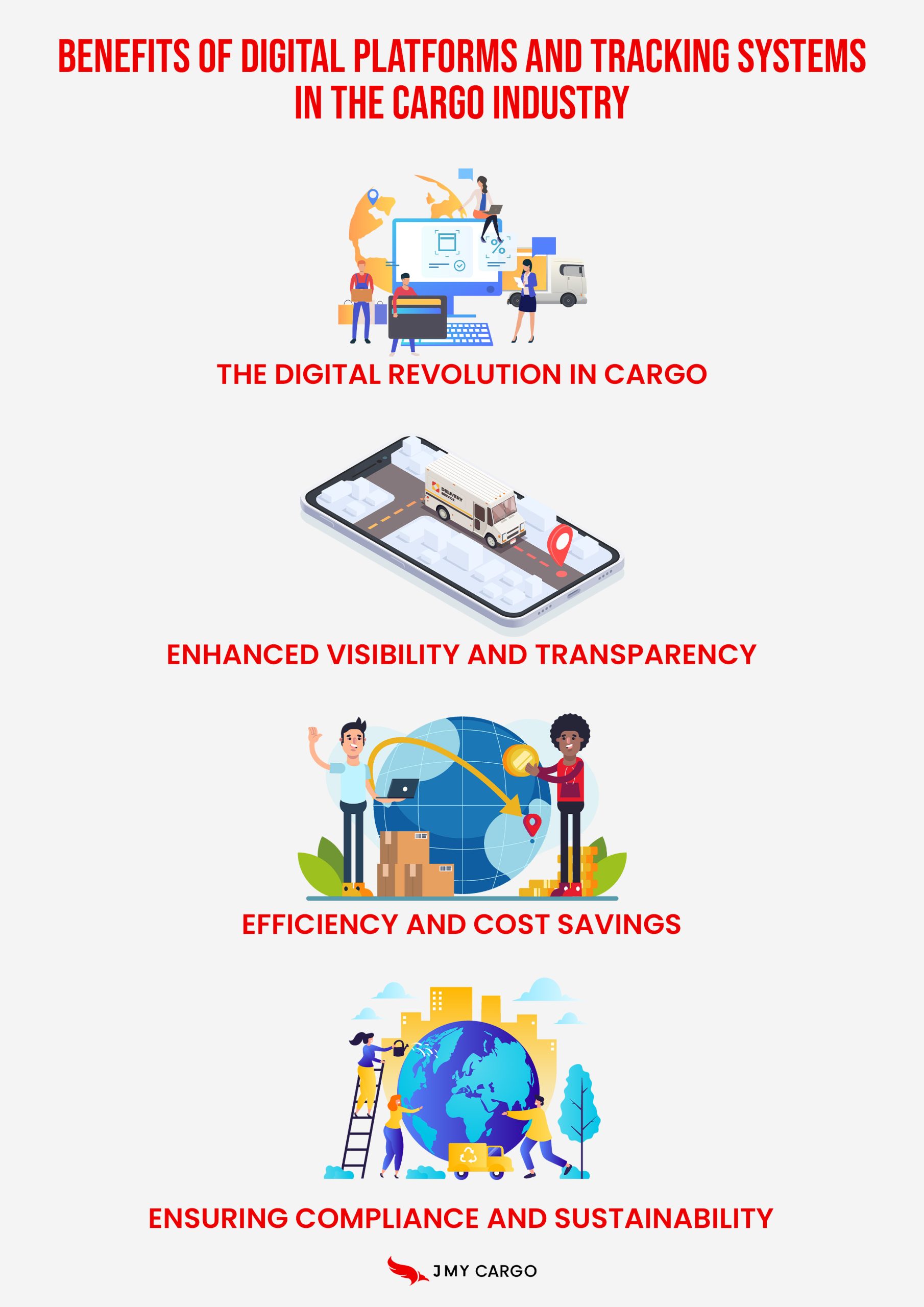Introduction
The cargo industry, once a labyrinth of paper-based processes and uncertainties, has undergone a remarkable transformation with the advent of digitalization and tracking systems. In recent years, technological advancements have revolutionized the way goods are transported, managed, and monitored throughout their journey. Digital platforms and tracking systems have emerged as powerful tools, offering real-time visibility and transparency, thereby enhancing efficiency, security, and customer satisfaction in the cargo industry.

The Digital Revolution in Cargo
The traditional cargo industry relied heavily on paperwork, making it susceptible to errors, delays, and inefficiencies. However, the integration of digital technology has disrupted this archaic system and paved the way for significant improvements. Digitalization has streamlined processes, eliminating paperwork and reducing human error while expediting communication between stakeholders.
Digitized platforms, powered by cloud computing and data analytics, have become the backbone of modern cargo operations. These platforms enable shippers, carriers, freight forwarders, and consignees to collaborate seamlessly. Real-time data exchange through digital channels has become the norm, allowing for prompt decision-making and proactive problem-solving. Additionally, automation and artificial intelligence have optimized various aspects of cargo handling, from booking to routing, ensuring more efficient and cost-effective operations.
Enhanced Visibility and Transparency
One of the most significant advantages of digitalization and tracking in the cargo industry is the unprecedented level of visibility and transparency it offers. Stakeholders can now track shipments in real-time, knowing the exact location, status, and condition of their goods throughout the supply chain. This transparency instills confidence in customers, who can monitor their cargo’s progress and anticipate any potential delays or issues, allowing them to plan accordingly.
Digital tracking systems use a combination of technologies such as GPS, RFID (Radio Frequency Identification), and IoT (Internet of Things) sensors to gather comprehensive data about shipments. This data includes information on temperature, humidity, shock, and tilt, ensuring the safety and integrity of sensitive or perishable goods. With this real-time tracking capability, cargo companies can also optimize routes, minimize idle time, and reduce the risk of theft or loss, enhancing overall supply chain security.
Efficiency and Cost Savings
The digitalization of cargo operations has significantly improved efficiency, saving valuable time and resources. Automated processes, digital documentation, and streamlined communication eliminate the need for manual interventions, reducing processing times and administrative burdens. This newfound efficiency benefits all stakeholders in the supply chain, as it leads to faster transit times and reduced lead times, ultimately improving customer satisfaction.
Moreover, digital platforms facilitate data-driven decision-making. With access to vast amounts of historical and real-time data, cargo companies can identify bottlenecks, optimize resource allocation, and make data-backed predictions for future demands. This data-driven approach allows for proactive planning and improved resource management, leading to substantial cost savings for all parties involved.
Ensuring Compliance and Sustainability
Another critical aspect of digitalization and tracking in the cargo industry is its impact on compliance and sustainability. As regulatory requirements continue to evolve, cargo companies must adhere to stringent guidelines concerning cargo safety, customs procedures, and environmental standards. Digital tracking systems play a vital role in ensuring compliance with these regulations, as they provide accurate and easily accessible records of cargo movements, documentation, and handling processes.
Additionally, the data collected through digital tracking systems empowers cargo companies to make informed choices about sustainable practices. By analyzing carbon footprints and emissions data, companies can identify opportunities to reduce their environmental impact. This newfound focus on sustainability not only benefits the environment but also enhances a company’s reputation and competitiveness in an increasingly conscious market.
Conclusion
The cargo industry’s digital transformation, driven by cutting-edge technologies and real-time tracking systems, has ushered in a new era of efficiency, transparency, and customer satisfaction. Digital platforms have streamlined operations, reduced paperwork, and improved collaboration among stakeholders. Real-time visibility and tracking capabilities provide valuable insights into shipment progress and enable proactive decision-making. Furthermore, the emphasis on data-driven efficiency and sustainability has made the cargo industry more resilient, compliant, and eco-friendly.
As technology continues to advance, the cargo industry must stay agile and embrace further innovations to keep pace with ever-changing customer demands and global trade dynamics. By harnessing the full potential of digitalization and tracking, the cargo industry is poised to thrive in a highly competitive and interconnected world.
